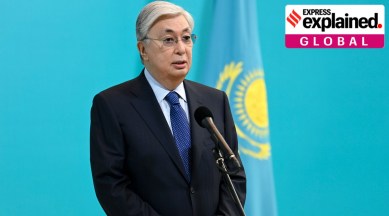Explained: Why has Kazakhstan voted to amend its Constitution?
Kazakhstan has voted in an overwhelming majority to reform the country's constitution. What are the amendments proposed, and why? How will this help the country's new president, Kassym-Jomart Tokayev?

Citizens of the Central Asian nation, Kazakhstan, in a historic vote on June 5, gave an overwhelming majority to proposed constitutional amendments to soviet-era laws under former president Nursultan Nazarbayev. The former president unexpectedly resigned in March 2019 after being in power for three decades.
According to preliminary results, Kazakhstan’s Central Election Commission on Monday said that 77 per cent of voters supported the constitutional amendments, while just under 19 per cent voted against them.
monthly limit of free stories.
with an Express account.
The reforms are a part of a drive called “New Kazakhstan”, headed by the current President, Kassym-Jomart Tokayev.
What was the referendum in Kazakhstan?
The referendum to the proposed changes in the constitution were first disclosed by President Tokayev during his State of the Nation address in March 2022, after thwarting an attempted ‘coup’ in January, and removing the former president and his relatives from key positions in the government. Nazarbayev was head of the security council. The protests against Nazarbayev’s government were sparked by a sharp rise in fuel prices, but the overall agitation also reflected wide public discontent with a stagnant economy and authoritarian government.
The 56 amendments include changes that will strip Nazarbayev of his “national leader” status which grant him lifetime privileges.
The most important amendment is the transition of the government body from a super-presidential model, which existed under the former president, to a presidential republic. Under these amendments, the president will be prohibited from having an affiliation with any political party during his tenure. This will also apply to the presidents and judges of all the courts, along with chairpersons and members of the Central Election Commission. The heads of the Supreme Audit Chamber will also have to follow the same.
In a report published by the state news agency, The Astana Times, the presidential quota in the Senate, the upper chamber of the Kazakh Parliament, will be reduced from 15 to 10 deputies, and five of them will be proposed by the Assembly of the People of Kazakhstan. The Assembly is a consultative/advisory body which represents ethnic groups in the country.
The reforms will also see changes in the judiciary. The re-establishment of the Constitutional Court will change the number of judges to 11, four more than at present. Six judges will be appointed by Parliament, while the other four will be appointed by the president. The Chairperson of the Constitutional Court will be appointed by the president with the consent of the Senate.
Further amendments to the constitution will focus on strengthening the role and enhancing the status of Parliament, instead of the president. President Tokayev has also called for higher taxes on the extractive industries and on high-income individuals.
The proposed changes included specific questions on modifications like prohibiting the death penalty.
They will also provide Kazakhs the right to directly appeal to the Constitutional Court for a review of normative legal acts.
State Secretary of Kazakhstan Erlan Karin, in a statement, said, “This will strengthen systemic human rights activities and supreme supervision over the observance of the rule of law in the territory of the country on behalf of the state.”
With the amendments to the laws, the ‘New Kazakhstan’ government promises to strengthen and protect the rights of citizens, which was under question during the 30-year rule of Nazarbayev.
How do these amendments help President Tokayev?
Hoping to move out of his predecessor’s shadow, Tokayev will want to cement his role as a long-awaited reformer after the referendum.
According to a report by news agency Reuters, the vote indicates that many citizens support the ouster of Nazarbayev, who ran the country for three decades before giving up the presidency in 2019 and picking Tokayev as a successor.
Securing domestic support will also help the 69-year-old career diplomat navigate the Ukrainian crisis, which has destabilised Kazakhstan’s economy and put it in a difficult geopolitical position between Russia and the West.
Tokayev was previously criticised for his decision to ask a Russia-led security bloc for help in January’s unrest, putting the Kazakh leadership in Russia’s debt, weeks before it invaded Ukraine. The violent protests had led to the deaths of more than 230 people.
With the passing of the referendum, Kazakhstan has moved away from Moscow and closer towards the West.
While Russia is Nur Sultan’s major economic and security partner, the West has invested hundreds of billions of dollars in its oilfields and mines.
Western sanctions against Russia due to the Ukrainian crisis have also hurt the Kazakh economy. The country’s currency Tenge plunged almost as much as the Russian Rouble did in March. However, President Tokayev has been very cautious in commenting on the crisis, urging all sides to act in line with the United Nations charter. The course of the Russia-Ukraine war will also decide Kazakhstan’s economic fate.
Newsletter | Click to get the day’s best explainers in your inbox